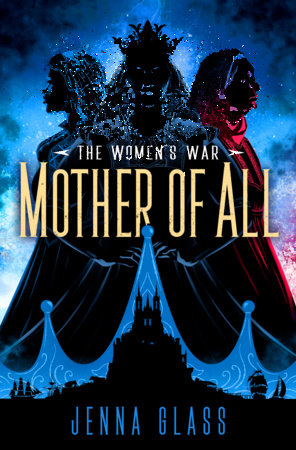Excerpt
The Women's War
Chapter One
Every year, when the long days of summer began their inevitable decline into fall, the winds in Aalwell changed direction. Instead of skimming along the coast, they began to blow inland, carrying the scent of sea and salt over the low-lying lands at the base of the cliffs. Unfortunately, they also carried the scent of the harbor, of rotting fish, of soggy streets, of too many unwashed bodies. The cliffs trapped most of the scent, confining all but the occasional foul whiff to the Harbor District. And this year when that wind change came, Alysoon Rai-Brynna reconsidered her decision to continue living in her late husband’s manor house rather than taking up residence in the royal palace above the cliffs. Her father had all but begged her to pack up her children and join him, but decades after he’d divorced her mother and made Alys and her brother technically illegitimate, she still hadn’t forgiven him. If the king wanted to spend time with his bastard daughter and his grandchildren, he could come down to the Terrace District; Alys would not go to him. Besides, the manor house was her home and had been for more than twenty years. She’d learned to live with the occasional foul whiff long ago.
On the most oppressive of autumn days, the gentry of the Terrace District either stayed inside their perfumed homes or flocked to the risers for a trip up to the Business District at the top of the cliffs. The merchants of the Business District loved oppressive autumn days above all others. Alys and her children had spent the last two days shopping, and if her eighteen-year-old daughter, Jinnell, had her way, they would spend a third. And probably a fourth. And a fifth. But Alysoon wasn’t about to let a few smelly breezes keep her from her weekly visit to the Abbey of the Unwanted, where her mother had resided since the divorce.
“But the Abbey will be intolerable!” Jinnell protested. “And you need some new gowns for winter now that you’re out of mourning.”
Alys suppressed a smile. She knew a disingenuous argument when she heard one, just as she knew the moment they reached the Business District, it wouldn’t be her own gowns they ended up shopping for.
“I do need new gowns,” Alys agreed, because it was true. Her winter wardrobe was almost two years out of date thanks to her year of official mourning. She doubted that her true mourning would ever end, but at least the grief was no longer quite so sharp as it had once been. “But I don’t need them today. And your grandmother is expecting me.”
Jinnell groaned dramatically as only a teenager could do. “Every time you visit the Abbey, people talk—and that’s not doing my marriage prospects any favors.”
Alys resisted the urge to roll her eyes. As long as the king was providing a generous dowry—over and above what Alysoon herself could offer from her husband’s estate—Jinnell’s marriage prospects were in no danger. As her daughter was well aware.
“I’ve been visiting the Abbey once a week since before you were born,” Alys said. “The damage is done, and I promise I’ll find you a nice goat farmer to settle down with. I’m sure we can find one under the age of sixty who will take you despite the disgrace I’ve brought down upon you.”
“Very amusing,” Jinnell said with a sour look on her usually sweet face. “I’ll die of boredom here. All my friends are shopping today.”
“You might try reading a book,” Alys suggested, receiving in response exactly the expression of disdain she expected. Alys had spent her whole life rebelling against the prevailing opinion that girls need not be educated beyond the basics required for managing a household, and jumped at every chance to read—especially if the subject matter was considered useless or inappropriate for females. Her daughter, however, would never dream of cracking open a book unless it was forced upon her.
“As you wish,” Alys continued with a careless shrug. “I’m going to the Abbey, and if you’re worried about death by boredom, you can always come with me. Your grandmother would love to see you.”
Jinnell wrinkled her nose. “Maybe in a month or so when the winds change again.”
Alys wasn’t surprised by the answer, and while she did on occasion force both of her children to accompany her on these visits, Jinnell was right and today would be especially unpleasant, thanks to the wind.
Leaving her daughter to sulk and her son to catch up on some lessons he’d neglected, Alys headed to the coach-house, which housed her carriages, horses, and chevals. Her groom was currying Smoke, her late husband’s horse, when she entered the coach-house. The poor creature was a shadow of his former self, his coat no longer gleaming, his head hanging in a habitual droop. Unlike Alys, Smoke had no friends and family to help ease the pain of loss and relieve the loneliness. Although Alys knew how to ride a horse, it was considered highly improper for a woman of her station to do so, and her son preferred his own horse to his father’s. Alysoon fed the horse a lump of sugar as an echo of grief stabbed through her and tightened her throat.
“Which cheval would you like, my lady?” the groom asked.
Alyson swallowed her grief and glanced over the row of inert chevals against one wall. “The black, I should think,” she said. It was the least lovely of the chevals, covered in plain black leather with no adornments, but it would show the dirt of the Harbor District the least.
The groom bowed, then moved to the chosen cheval. His eyes turned milky white as he opened his Mindseye and fed some Rho into the cheval, which promptly came to life and gave a very horselike snort and stamped one wood-and-leather leg. As if the crafter who’d made it thought someone might mistake it for a real horse despite its lifeless eyes or its complete lack of personality. Then again, it wasn’t temperamental or missing its master, as the real horses were.
The groom hitched the cheval to Alysoon’s smallest carriage as her coachman, Noble, emerged from the servants’ quarters in the rear of the coach-house.
“The Abbey, my lady?” he asked as he helped her into the carriage, but it wasn’t really a question, for he knew her routine by heart—as did the rest of her household.
Falcor, her master of the guard, arrived right on Noble’s heels. He would sooner fall on his sword than allow Alys to leave the house unaccompanied. She had nothing against the men of her honor guard, but they were just one more reason she longed for the days when Sylnin was alive. As long as she’d had a husband to “look after” her, her father had allowed her to refuse the honor guard that was her due as a king’s daughter. But the day after Sylnin had passed, Falcor and his men had shown up on her doorstep and refused to leave. She frequently had to remind herself not to be unkind to the men who had no choice but to follow orders.
Alys allowed Falcor to climb onto the back of the coach without demur, having long ago resigned herself to the intrusion. Many women enjoyed more freedom when they became widows, but thanks to her royal lineage, Alys had less. She drew the sheers over the carriage’s windows.
The carriage descended the three sets of terraces, then clattered through the crowded streets of the Harbor District, the cheval expertly dodging pedestrians and horse-drawn carts and pits in the road, passing fish markets and taverns and storehouses all teeming with noonday business. Alys’s cheval carriage was well-known along this route, and while the street merchants eyed it longingly, none tried to approach and offer her their wares. It was unseemly enough for a woman of her stature to set foot in the Harbor District. To make purchases there was unthinkable.
The carriage eventually wended its way to the half-moon-shaped Front Street, which ran from one end of the harbor clear to the other. A massive warship was docked at the naval base near the Citadel, its crew and a platoon of dock workers busily repairing and refitting it after its tour of duty. Several smaller warships were docked quietly nearby, and one was putting out to sea, most likely for patrol duty. Aaltah hadn’t seen true war since Alys was a child, and these days Aaltah’s navy mostly did battle with pirates and smugglers. But the Lord Commander of the Citadel made sure all soldiers and sailors were kept battle-ready, for the kingdoms and principalities of Seven Wells had a habit of war that stretched back to the very beginnings of recorded history.
Between the naval base and the dockyard at the other end of the harbor, the water was packed tight with a ragged flotilla. Here was where the commoners who weren’t rich enough to afford a home on land settled, with their rickety crafts of questionable seaworthiness. Whole families lived on tiny boats with open cabins, braving the weather for easy access to Aal, the primary element produced by Aaltah’s Well. Thanks to the Well, Aal was almost as plentiful here as Rho, the most common of all elements. Aal was the primary element in many spells associated with movement—including the spell that powered the cheval—and was thus one of the mainstays of Aaltah’s economy.
The flotilla was responsible for a good deal of the Harbor District’s stink, and it seemed that every year at this time, some city councilman would bring a proposal to the king to outlaw it. And every year, the king refused, because having so many commoners who could see Aal was convenient when a great deal of Aaltah’s economy relied on the export of Aal-infused magic items.
As the carriage made its way down Front Street to the Abbey at the far end of the harbor, Alys opened her Mindseye, secure in the knowledge that no one would see her doing it through the window sheers. Her physical vision blurred and became indistinct as the elements of magic came into crisp focus.
As with anywhere in the known world, the most immediately visible element was Rho—pure white globes the size of pebbles. Every living thing was surrounded by sparkling motes of Rho, and the Well spilled thick clouds of it into the atmosphere. The second-most common element this near the Well was, of course, Aal, which in Mindsight looked like a child’s glass marble in a mixture of white and cloudy blue. Mingled with the motes of Aal and Rho were countless other elements, forming a beautiful tapestry of colors that never failed to take her breath away. Alys reached out to touch a radiant royal blue mote with flecks of gold in it, and for the millionth time, she wished she’d been born a man so that the world of magic were open to her. Her son, Corlin, was just beginning his magical education as adolescence developed his Mindseye. Many times she had been tempted to crack open his primer, which he often left laying around after his lessons, but she had so far resisted the urge.
Reluctantly, Alys closed her Mindseye. It was her particular form of self-torture to gaze longingly at that which was forbidden to her. Every time she opened her Mindseye, she told herself that this would be the last time, that she would not allow herself to be tempted yet again. But it was always a lie, and in the privacy of her home, with her husband gone and a locked door between herself and the rest of the household, she had occasionally been known to dabble. Very little, however. Forbidden to read spell compendiums and able to recognize and name only a handful of the myriad elements she could see, it was too dangerous for her to do any serious experimentation.
The Abbey walls loomed before her, twice again as tall as the nearest buildings. While the place was not technically a prison, no one had seen fit to inform its designers of the fact. Built of cold gray stone, with narrow windows and unlovely blocklike towers, it inspired a sense of foreboding in Alys’s heart every time she passed through its gates. It was a stark reminder of what would happen to her if she were ever caught “dabbling” in magic. Being the king’s daughter afforded her many freedoms that other women lacked, but that freedom had its limits.
Just past the Abbey’s walls lay the purpose of the Abbey’s existence: the Women’s Market. Stalls and booths were set up all along the courtyard’s perimeter, each manned by at least one red-robed abigail and selling the magic that only women could create. Love charms, minor healing potions, beauty enhancers, sex enhancers—and sex. This was called the Abbey of the Unwanted because it was filled with women no one wanted as wives. Women who were unchaste—or at least accused of being so. Women who were disobedient, who caused trouble, or who inconvenienced their husbands or fathers. Women like Alys’s mother, who had gotten in the way of her husband’s desire to marry another.
All were tainted beyond redemption in the eyes of society, and with that taint and the virtual imprisonment that resulted came the permission to practice magic. Polite society might frown upon women practicing magic, but that didn’t stop polite society from buying and using the magic created by these ruined women. Likewise, polite society might consider it inappropriate for a woman to have sexual relations with anyone but her husband, but that didn’t stop Aaltah’s men from buying the sexual favors of whichever young and pretty abigail caught their eye.
The stalls selling magic items were dwarfed by the pavilion at the far end of the courtyard, where the Abbey’s most desirable displayed themselves as merchandise, their long red robes put aside for tiny scraps of red fabric that covered the bare minimum of their bodies. Men mobbed the pavilion, placing bids on their favorites, competing with one another in bidding wars that sometimes devolved into brawls.
Once upon a time, Alys’s mother had been one of those women. Thirty years old when she was set aside, Brynna Rah-Malrye would have been considered too old to work the pavilion had she been any other woman. But a woman who had once been queen was too profitable a commodity to pass up, commanding a higher price than any three women combined. The thought that her father had allowed her mother to be so humiliated and abused lit a fire in Alys’s veins every time she entered the Abbey’s courtyard and saw the pavilion. He could shower her with gifts and affection until the day he died, and still she would never forgive him.
It was a time Brynna never spoke about with her daughter, and Alys was happy to keep the silence. She was also glad that when she’d visited her mother in the Abbey as a child, she hadn’t understood what those women in the pavilion were selling.






